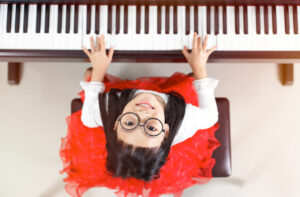Wondering if it’s worth starting piano lessons early? As private music teachers, we’ve seen firsthand how music transforms young learners—and we’ve also heard directly from the families who’ve lived it.
In this post, we’re sharing real stories and quotes that highlight the lasting impact of piano lessons for young kids, from toddlers to early elementary students. Whether you’re on the fence or already enrolled, these voices from our community will inspire you.
“Piano helped my son focus at school.” – Alicia, Parent of a 6-year-old
Before piano, Alicia’s son had trouble sitting still for more than a few minutes. Three months into lessons, she noticed something new.
“He started focusing longer—not just during music, but in class and at home. Piano gave him a reason to concentrate.”
Why it works: Learning to play requires discipline, pattern recognition, and fine motor control—all of which translate to better classroom habits.
“Her confidence grew with every song.” – Mr. Daniels, Piano Teacher
As a teacher, Mr. Daniels recalls one shy 7-year-old student who could barely speak at her first lesson.
“She lit up the first time she performed for her family. It was just ‘Twinkle Twinkle,’ but her smile said it all.”
Why it works: Piano offers visible progress, which builds confidence through small, frequent wins. Performing (even just at home) reinforces self-assurance.
“I like making up my own songs!” – Liam, Age 5
Young students are naturally curious—and piano gives them the tools to explore.
Why it works: Music encourages early creativity. Students can improvise, compose, and experiment in ways that feel like play—not work.
Looking for more ways to spark musical fun? Try incorporating ear training games into lessons to build listening skills through play.
“Music calms her like nothing else.” – Priya, Parent of a 4-year-old
Priya shared that after piano lessons, her daughter is noticeably calmer—even when the day starts out rocky.
“She gets in her zone. Her teacher said music is helping her regulate emotions, and I really believe it.”
Why it works: According to Harvard Medical School, music helps reduce stress by activating the parasympathetic nervous system. It’s a natural emotional outlet for kids.
“He uses both hands independently now—and he’s only 6!” – Jordan, Teacher
Coordination, muscle development, and left/right hand independence are all boosted through piano.
Why it works: Piano uniquely challenges both hemispheres of the brain. This supports early motor development and brain integration.
“We started just for fun—but now it’s part of our family routine.” – Rebecca, Parent
Starting piano doesn’t have to mean committing to a lifetime of classical recitals. Sometimes, it’s just about making music at home.
“She plays while we cook. Her little sister sings along. It’s become part of our daily life.”
FAQ: Starting Young
What’s the best age to start piano lessons?
Many students begin between ages 4–6, but some can start earlier with a playful, patient approach.
Do young kids need a full piano?
A full-sized, weighted-key digital piano is ideal. We often recommend starter models from Sweetwater’s beginner selection for young learners.
What if my child loses interest?
It’s common to go through ups and downs. The key is choosing the right teacher and mixing structured lessons with playful exploration.
